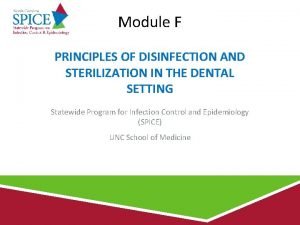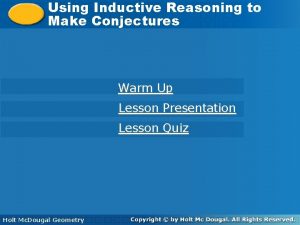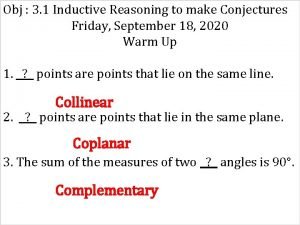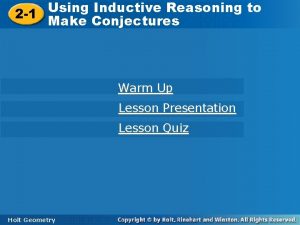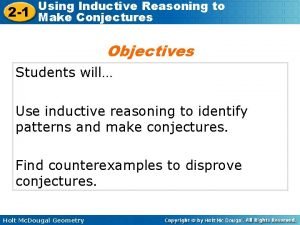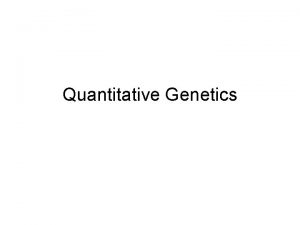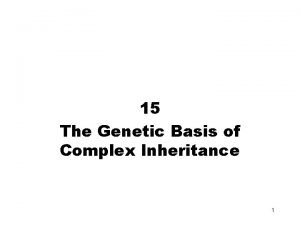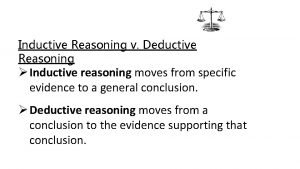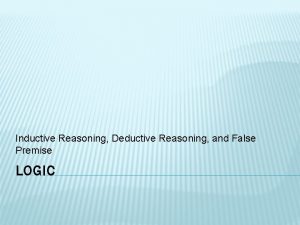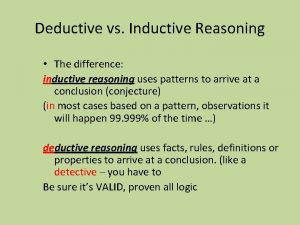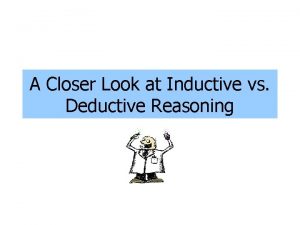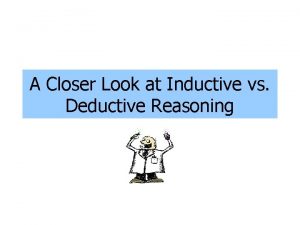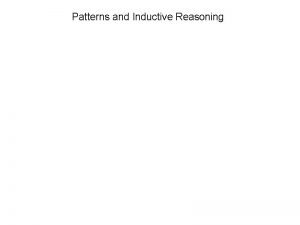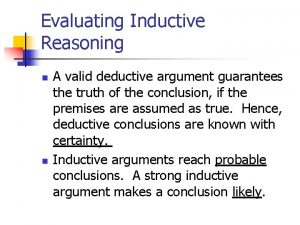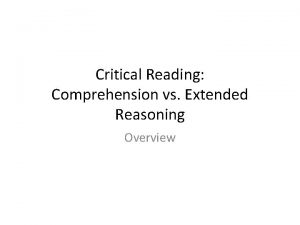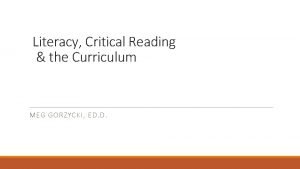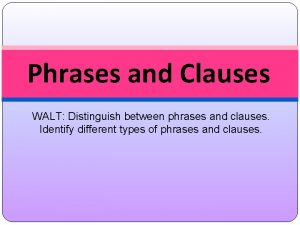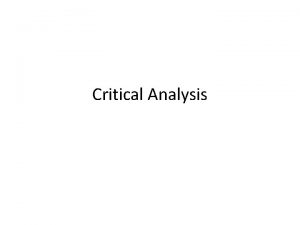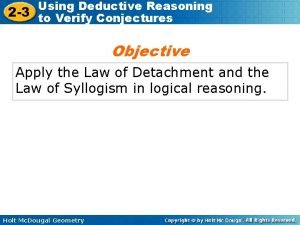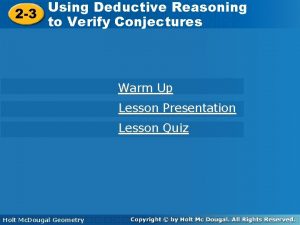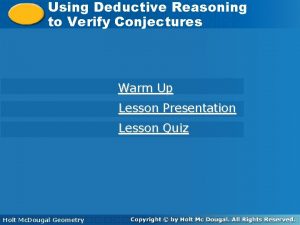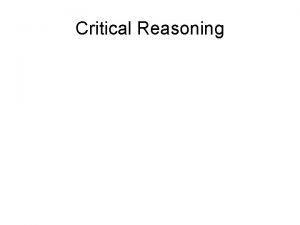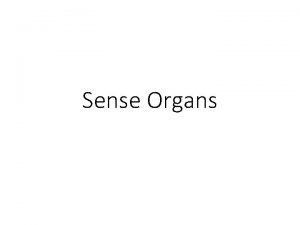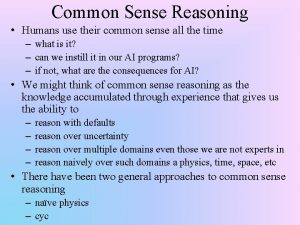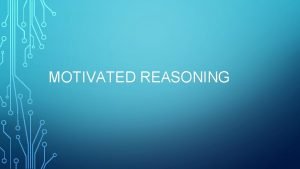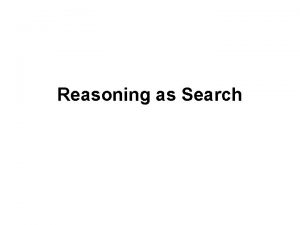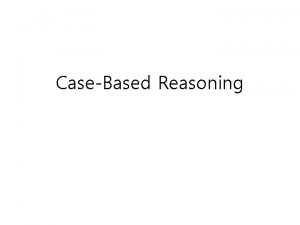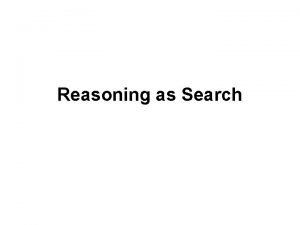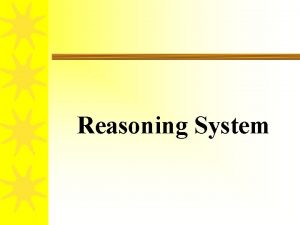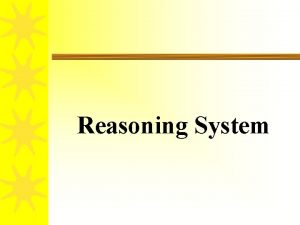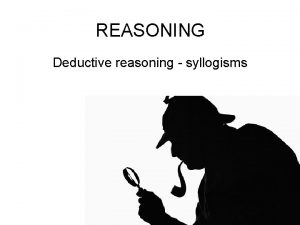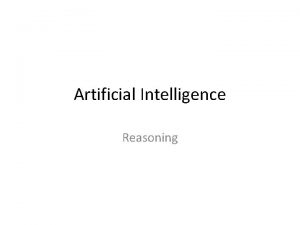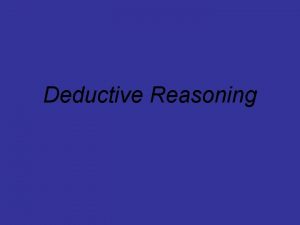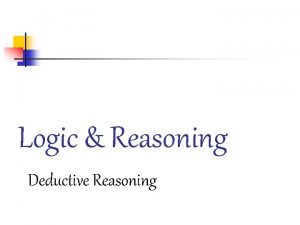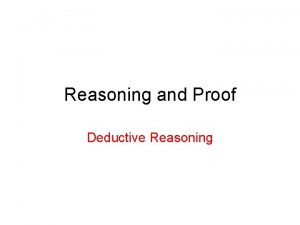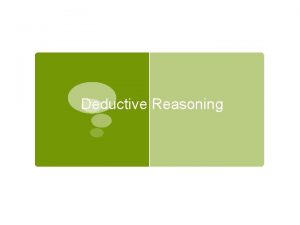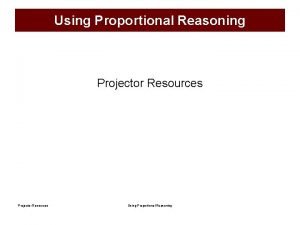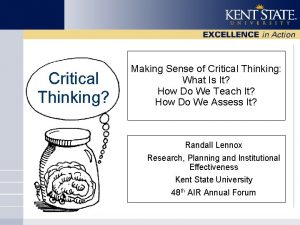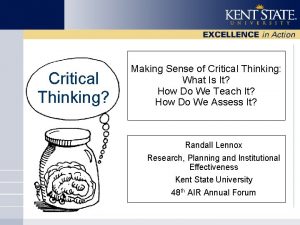Using Critical Reasoning to Make Sense of Hopes



























- Slides: 27

Using Critical Reasoning to Make Sense of Hopes and Hypes The Promise of Precision Medicine A. Cecile J. W. Janssens, Ph. D Professor of Translational Epidemiology Department of Epidemiology




Two questions to make sense of promises • What exactly is the promise? • How likely is it to be true? What exactly is the promise? … closer … … like … … personalized … … need … … healthier …

The Problem of ‘Fact’-Checking Promises • Promises are about the future • We cannot check in the present whether they are true • We can only reason whether they likely might be true … and then check the validity and strength of the premises Promises Unli Imp kely oss ible Adapted from: Elizabeth Goodman (via sharenet)

What is reasoning? Reasoning: the process of thinking about ‘something’ in a logical way in order to form a conclusion or judgment (Merriam-Webster) ‘something’ = observations, facts, rule, laws of nature, etc. Inference: Reaching the conclusion based on observations through reasoning Argument: the set of sentences that state the observations (premises) and the conclusion such that the conclusion is asserted on the basis of the premises and the premises are reasons to believe that the conclusion is true Adapted from Talbot, 2014

Example of argument Premise 1: Premise 2: Conclusion: All swans are white The bird is a swan The bird is white If the premises are true, you know that the bird is white because the reasoning is logically valid. You do not need to see the bird to know this.

Example of argument in prenatal testing Premise 1: Premise 2: Conclusion: All fetuses with 3 copies of chromosome 21 have Down syndrome The fetus has three copies of chromosome 21 The fetus has Down syndrome If the premises are true, you know that the baby has Down syndrome because the reasoning is logically valid. Because this is logically valid, you do not have to wait until the baby is born, you can draw that conclusion prenatally, in very early stage of fetal development

Premise 1: Premise 2: Conclusion: All fetuses with 3 copies of chromosome 21 have Down syndrome The fetus has three copies of chromosome 21 The fetus has Down syndrome Is this really valid? What is missing? (What is assumed? )

Hidden premises Premise 1: Premise 2: Premise 3: Conclusion: All fetuses with 3 copies of chromosome 21 have Down syndrome The fetus has three copies of chromosome 21 The chromosome test is 100% valid The fetus has Down syndrome Hidden, or surpressed, premises are implicit, not specified, but essential for the validity of the reasoning. They may be neutral and too obvious to even consider as premise, but they may also be controversial

Example of surpressed premise In human gene editing research the embryo is always killed, so human gene editing research is wrong because it is wrong to kill innocent persons. Adapted from Talbot, 2014 Premise 1: Premise 2: (Surpressed) Conclusion: In human gene editing research the embryo is always killed It is wrong to kill innocent persons Embryos are persons Human gene editing research is wrong

Another example Premise 1: Premise 2: Conclusion: All women with a known BRCA 1/2 mutation develop breast cancer The woman has a known BRCA 1/2 mutation The woman will develop breast cancer A valid argument? Yes, it’s logically valid, but it is not sound Arguments are sound when the premises are correct How can we change the premises/conclusion to make the argument correct?

Another example Premise 1: Premise 2: Conclusion: The majority of women with a known BRCA 1/2 mutation develop breast cancer The woman has a known BRCA 1/2 mutation The woman may develop breast cancer A valid argument? Can the opposite be true? Premise 1: Premise 2: Conclusion: The majority of women with a known BRCA 1/2 mutation develop breast cancer The woman has a known BRCA 1/2 mutation The woman may not develop breast cancer Which conclusion is most likely?

Can we make the latter argument stronger by adding premises? Premise 1: Premise 2: Premise 3: Conclusion: The majority of women with a known BRCA 1/2 mutation develop breast cancer The woman has a known BRCA 1/2 mutation The woman had mastectomy ? ? ? The woman may not develop breast cancer

Down Syndrome BRCA 1/2 By Farcaster - Power. Point slide based on argument terminology

Errors in reasoning: fallacies Argument 1: Premise 2: Conclusion: Argument 2: Premise 1: Premise 2: Conclusion: All fetuses with 3 copies of chromosome 21 have Down syndrome The fetus has three copies of chromosome 21 The fetus has Down syndrome All fetuses with Down syndrome have 3 copies of chromosome 21 The fetus has three copies of chromosome 21 The fetus has Down syndrome Why is the second argument invalid?

Using logic to validate conclusions Conclusion: Premise 1: Premise 2: The bird is white The bird is a swan ? ? ? What need to be the other premise(s) to make the conclusion logically valid?

Using logic to validate conclusions Conclusion: Premise 1: Premise 2: The man will develop Huntington’s disease … … Conclusion: Premise 1: Premise 2: Premise … The man will develop type 2 diabetes … … …


Using logic to validate conclusions Conclusion: Genetically-personalized diet recommendations work better than standard diet Premise 1: Premise 2: Premise 3: Premise 4: Can you make an argument that lead to this conclusion? Hint: try to make a strong argument, premises do not need to be true

Possible argument Conclusion: Genetically-personalized diet recommendations work better than standard diet Premise 1: General one-size-fits-all diets don’t work for many people Premise 2: Genes have statistically significant association to nutrition, usually in studies published before 2008 Premise 3: A (wishy-washy small) RCT showed one or more (borderline) statistically significant benefits between the genetically-personalized and control diet Premise 4: A statistically significant result in the RCT means that the genetically-personalized diet works better


Conclusion: Premise 1: Premise 2: Premise 3: Premise 4: The Precision Medicine Initiative will find how to match a cancer cure to our genetic code

Conclusion: The Precision Medicine Initiative will find how to match a cancer cure to our genetic code Premise 1: A blood transfusion can be matched to a blood type: targeting treatment solves ‘problem’ Premise 2: PMI will sequence a large number of cancer tumors Premise 3: Mutations in cancer tumors will match with treatment response Premise 4: Response to treatment means cure of cancer Which premises are most uncertain to be true?

Take home message • We can’t check promises (because they are about the future), but we can check the premises on which they are possibly based • Promises mostly result from inductive reasoning, they are true with some degree of probability • Logic reasoning gives guidance for identifying weak/strong promises • Judging whether a promise is likely true – Think about possible valid arguments that lead to promise – Evaluate their premises: are they true and convincing? • Use your expertise, and lots of common sense

Further reading Talbot, 2014
 Critical semi critical and non critical instruments
Critical semi critical and non critical instruments Semi-critical
Semi-critical Using inductive reasoning to make conjectures answers
Using inductive reasoning to make conjectures answers Using inductive reasoning to make conjectures
Using inductive reasoning to make conjectures Using inductive reasoning to make conjectures
Using inductive reasoning to make conjectures Using inductive reasoning to make conjectures
Using inductive reasoning to make conjectures Narrow sense heritability vs broad sense heritability
Narrow sense heritability vs broad sense heritability Narrow sense heritability vs broad sense heritability
Narrow sense heritability vs broad sense heritability V
V Inductive and deductive reasoning
Inductive and deductive reasoning Deductive vs inductive reasoning
Deductive vs inductive reasoning Inductive reasoning vs deductive reasoning geometry
Inductive reasoning vs deductive reasoning geometry Deductive vs inductive geometry
Deductive vs inductive geometry Inductive reasoning patterns
Inductive reasoning patterns Deductive thinking
Deductive thinking Weak sense critical thinking
Weak sense critical thinking Hopes dreams and aspirations
Hopes dreams and aspirations I wish present
I wish present Environmental factors of florence nightingale
Environmental factors of florence nightingale Cover yourself with hopes and dreams
Cover yourself with hopes and dreams Extended reasoning questions
Extended reasoning questions Critical reading meaning
Critical reading meaning Clause example
Clause example Spell makes sense
Spell makes sense Critical reading meaning
Critical reading meaning Using deductive reasoning to verify conjectures
Using deductive reasoning to verify conjectures 2-3 using deductive reasoning to verify conjectures
2-3 using deductive reasoning to verify conjectures Using deductive reasoning to verify conjectures
Using deductive reasoning to verify conjectures

